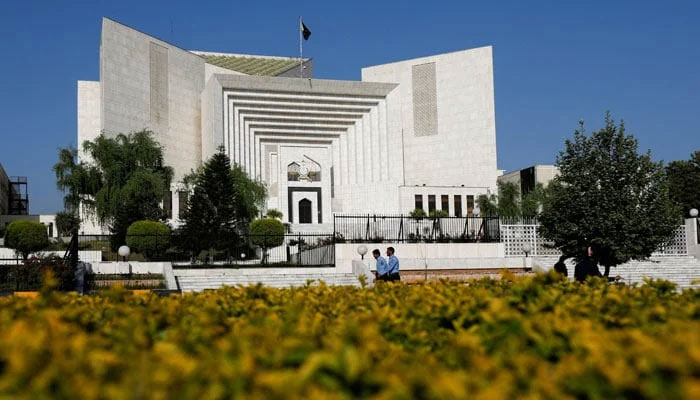Impending clash?
It is imperative to underscore that an independent judiciary is the cornerstone of a democratic state
The vicious cycle of political instability continues in the country while the people of Pakistan are struggling hard to make ends meet. As the government grapples with challenges on many fronts, PTI founder Imran Khan has predicted it has only two months left in power. Such predictions may not be new, but they do lead to speculations on whether something is happening behind the scenes. Observers say that Khan says such provocative things because he knows how to stay relevant and alive in the news cycle as well as to put political pressure on the government. Others believe that, while the two months deadline is just up in the air, the tensions between the executive and the judiciary do have a real chance of escalating, which may lead to some grave consequences for the government. The PML-N government and its leaders have been criticizing the judiciary for some time now because of the ‘relief’ they say the PTI is allegedly getting. Last month’s reserved seats verdict by the Supreme Court added fuel and the latest to jump onto this is chairman of the PPP Bilawal Bhutto-Zardari. Addressing the National Assembly, Bilawal Bhutto spoke about judicial interference in the functioning of parliament, creating a constitutional crisis in the country. “In Pakistan a storm in a teacup is being converted into a full-blown constitutional crisis… This is [a] crisis of the judiciary, by the judiciary and for the judiciary.”
The scathing critique by Bilawal Bhutto aside, observers have been saying for quite a while now that an institutional clash is not just inevitable but will happen sooner rather than later. A day after Bilawal’s fiery speech, Justice Mansoor Ali Shah spoke at a seminar and reminded that the SC’s decisions have to be implemented, reiterating that not implementing a decision of the apex court is a violation of the constitution – “That is the system of this country. That is the constitution of this country.” He warned the government against executive overreach, explaining that disregarding the apex court’s rulings was also “against the separation of powers”. For the moment, the ‘clash’ as it were is restricted to words but the way that the government passed amendments to the Election Act 2017 is being seen as a precursor to not implementing the SC’s reserved seats verdict. If this verdict is not implemented, there is bound to be a more serious situation.
It is imperative to underscore that an independent judiciary is the cornerstone of a democratic state. It is the final arbiter of justice, safeguarding the rights of citizens and upholding the rule of law. However, judicial overreach can also undermine democratic principles. Equally important is the role of the legislature. As the voice of the people, it must enact laws that reflect the aspirations of the nation. That said, any attempt to curtail judicial independence or undermine the separation of powers is a dangerous precedent. Pakistan cannot afford a prolonged institutional conflict. A political crisis will only exacerbate the many problems the country faces. It would be wiser for the executive to take a step back and resolve its issues with the judiciary instead of heating things up further. The ultimate responsibility lies with the political leadership which must demonstrate statesmanship and prioritize the interests of the nation over partisan gains.
-
 All You Need To Know Guide To Rosacea
All You Need To Know Guide To Rosacea -
 Princess Diana's Brother 'handed Over' Althorp House To Marion And Her Family
Princess Diana's Brother 'handed Over' Althorp House To Marion And Her Family -
 Trump Mobile T1 Phone Resurfaces With New Specs, Higher Price
Trump Mobile T1 Phone Resurfaces With New Specs, Higher Price -
 Factory Explosion In North China Leaves Eight Dead
Factory Explosion In North China Leaves Eight Dead -
 Blac Chyna Opens Up About Her Kids: ‘Disturb Their Inner Child'
Blac Chyna Opens Up About Her Kids: ‘Disturb Their Inner Child' -
 Winter Olympics 2026: Milan Protestors Rally Against The Games As Environmentally, Economically ‘unsustainable’
Winter Olympics 2026: Milan Protestors Rally Against The Games As Environmentally, Economically ‘unsustainable’ -
 How Long Is The Super Bowl? Average Game Time And Halftime Show Explained
How Long Is The Super Bowl? Average Game Time And Halftime Show Explained -
 Natasha Bure Makes Stunning Confession About Her Marriage To Bradley Steven Perry
Natasha Bure Makes Stunning Confession About Her Marriage To Bradley Steven Perry -
 ChatGPT Caricature Prompts Are Going Viral. Here’s List You Must Try
ChatGPT Caricature Prompts Are Going Viral. Here’s List You Must Try -
 James Pearce Jr. Arrested In Florida After Alleged Domestic Dispute, Falcons Respond
James Pearce Jr. Arrested In Florida After Alleged Domestic Dispute, Falcons Respond -
 Cavaliers Vs Kings: James Harden Shines Late In Cleveland Debut Win
Cavaliers Vs Kings: James Harden Shines Late In Cleveland Debut Win -
 2026 Winter Olympics Snowboarding: Su Yiming Wins Bronze And Completes Medal Set
2026 Winter Olympics Snowboarding: Su Yiming Wins Bronze And Completes Medal Set -
 Trump Hosts Honduran President Nasry Asfura At Mar-a-Lago To Discuss Trade, Security
Trump Hosts Honduran President Nasry Asfura At Mar-a-Lago To Discuss Trade, Security -
 Cuba-Canada Travel Advisory Raises Concerns As Visitor Numbers Decline
Cuba-Canada Travel Advisory Raises Concerns As Visitor Numbers Decline -
 Anthropic Buys 'Super Bowl' Ads To Slam OpenAI’s ChatGPT Ad Strategy
Anthropic Buys 'Super Bowl' Ads To Slam OpenAI’s ChatGPT Ad Strategy -
 Prevent Cancer With These Simple Lifestyle Changes
Prevent Cancer With These Simple Lifestyle Changes




